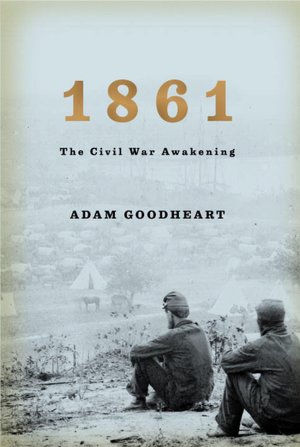I attended a book club discussion this evening of 1861: The Civil War Awakening by Adam Goodheart; It occurred to me to imagine a conversation with one of the leaders of South Carolina or Georgia who had proposed secession but to hold that conversation in 1867.
Q. Were you one of the leaders in the secession movement in 1860 and 1861?
A. Yes.
Q. How did that work out for you?
Of course, the South had lost the war. Hundreds of thousands of its young men were killed, even more were wounded, and the even more had had a horrendous four years. Sherman had marched to the sea and then marched to South Carolina's capital destroying everything in his wide path. Slavery had been abolished, all the slaves freed, and their owners had not been reimbursed for the value of that former property. The cotton export business was ruined.
One could imagine a similar conversation with a Virginian.
Q. When a vote was first taken on secession, the vote was strongly for union, right?
A. Yes.
Q. But when it was taken a second time, the vote was reversed and Virginia joined the Confederacy?
A. Right.
Q. How did that work out for you?
Of course, the war was disastrous for Virginia. The Army of Virginia took terrible losses. Campaigns were fought all over the state leaving desolation in their wake. Here too the economy was ruined, the slaves freed without recompense to their owners, and capital drained from the state.
What if Virginia had decided to stay with the Union? Might North Carolina and Tennessee also stayed with the Union? Might Virginia and North Carolina have found it possible to negotiate a compromise that would have brought the deep South back into the Union, especially since it would have been clear even to the most committed secessionist that a Civil War would be a disaster for the South; might it have negotiated a compromise that would have been acceptable to the Northern states satisficing their demand for free labor and their opposition to slavery? At the least, the war in the East would have been shorter and would have taken place south of Virginia, avoiding Bull Run, Gettysburg, Antietam, the Wilderness, and the Siege of Richmond.
Could there have been a better path for all? Surely there could have been. A gradual process abolishing slavery, prohibiting its extension into new states, emancipating the slaves over time with payment to their owners and preparation of the slaves for independence, and avoidance of civil war would have been better for the South. Indeed it would probably have been better for the slaves and for the North.
Why was this path not chosen? That seems to me the important question, in the sense that we might learn a lesson that we could use to avoid similar stupid public policy decisions.
Some of the reasons were:
- The political processes in the South were completely dominated by slave owners, often very wealthy owners of many slaves, and their economic interests were to protect the status quo even in the face of huge risks (which would be shared by many others)/
- The newspapers in the South were beating the drums for war, and doing very well in the run up to the war by doing so.
- The religious establishment in the South preached that slavery was a divinely inspired institution, and that God would be on the side of slavery in any war.
- There was pervasive racism, and neither the North nor the South could see what to do with the slaves once emancipated.
- While there were politicians who saw the futility of the Southern side's efforts in the war, and indeed who saw that globally slavery (at least as practiced in the American south) was doomed in the 19th century, the public listened to the more inflammatory politicians and the process left the peace makers ineffective.
- The North too failed to find a way towards a negotiated survival of the Union.
In defense of the people of the time, many recognized the danger in which democracy stood. The defeat of the democratic movements in Europe in 1848 had left a strong impression on Americans. Many, perhaps appropriately, saw the Union as the last, best hope of mankind. Had the Union broken apart in 1861 and not been put together again, the future of the world would have been changed greatly; the lives of hundreds of millions of Americans would have been much worse than they have been.
One lesson is that some of the people starting a war may be making a very bad mistake. However, that lesson seems to need to be relearned again and again over the course of history.

No comments:
Post a Comment